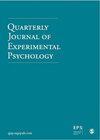表达:视障人士在使用分配中心视角和自我中心视角进行心理地图导航时的先前视觉经验
IF 1.5
3区 心理学
Q4 PHYSIOLOGY
引用次数: 0
摘要
本研究利用心理比较任务范式的新发展,探讨了在没有任何协议强加的视角的情况下,先前的视觉经验对自然使用心理视角完成心理空间任务的影响问题。在实验中,39 名参与者(11 名早期失明者、13 名晚期失明者和 15 名蒙眼近视者)探索了两张走廊地图,以记忆走廊上 10 个物体的空间排列。学习阶段结束后,进行了几项针对心理空间表征中使用的空间记忆和推理的任务。蒙眼视力正常的受试者偏好以自我为中心的视角,而两组视力受损的受试者在以自我为中心的视角和以分配为中心的视角之间没有表现出明显的偏好。结果表明,无论视觉经验如何,以自我为中心的视角都比以分配为中心的视角更具优势。我们的结果揭示了以前关于认知心理地图构建的假设,表明有必要对以前的结果及其对强加的心理视角的依赖性进行反思。本文章由计算机程序翻译,如有差异,请以英文原文为准。
EXPRESS: On prior visual experience in mental map navigation using allocentric and egocentric perspectives in the visually impaired
Using new developments in the mental comparison task paradigm, this study addresses the question of the influence of prior visual experience in the natural use of mental perspective to achieve mental spatial tasks without any protocol-imposed perspective. During the experiment, 39 participants (11 early blind, 13 late blind, and 15 blindfolded-sighted) explored two corridor maps to memorise the spatial arrangement of 10 objects disposed along corridors. After the learning phase, several tasks addressing spatial memory and reasoning used in the mental spatial representation were performed. Blindfolded-sighted participants preferred an egocentric perspective, while the two visually impaired groups showed no overriding preference between egocentric and allocentric perspectives. Results showed a performance advantage for egocentric over allocentric perspectives, regardless of visual experience. Our results shed light on previous assumptions regarding cognitive mental map construction, suggesting the need to reflect on previous results and their dependence on imposed mental perspectives.
求助全文
通过发布文献求助,成功后即可免费获取论文全文。
去求助
来源期刊
CiteScore
3.50
自引率
5.90%
发文量
178
审稿时长
3-8 weeks
期刊介绍:
Promoting the interests of scientific psychology and its researchers, QJEP, the journal of the Experimental Psychology Society, is a leading journal with a long-standing tradition of publishing cutting-edge research. Several articles have become classic papers in the fields of attention, perception, learning, memory, language, and reasoning. The journal publishes original articles on any topic within the field of experimental psychology (including comparative research). These include substantial experimental reports, review papers, rapid communications (reporting novel techniques or ground breaking results), comments (on articles previously published in QJEP or on issues of general interest to experimental psychologists), and book reviews. Experimental results are welcomed from all relevant techniques, including behavioural testing, brain imaging and computational modelling.
QJEP offers a competitive publication time-scale. Accepted Rapid Communications have priority in the publication cycle and usually appear in print within three months. We aim to publish all accepted (but uncorrected) articles online within seven days. Our Latest Articles page offers immediate publication of articles upon reaching their final form.
The journal offers an open access option called Open Select, enabling authors to meet funder requirements to make their article free to read online for all in perpetuity. Authors also benefit from a broad and diverse subscription base that delivers the journal contents to a world-wide readership. Together these features ensure that the journal offers authors the opportunity to raise the visibility of their work to a global audience.

 求助内容:
求助内容: 应助结果提醒方式:
应助结果提醒方式:


